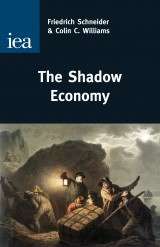Shadow Economies Grow as People Flee High Taxes and Stiff Regulations


Otherwise legal off-the-books economic activity is on the rise again in much of the world, says a new report, with the "shadow economy" comprising huge chunks of many nation's economies. There's no need for speculation as to why, say the authors. High taxes and stringent regulations have made it very attractive and even necessary for people to earn their keep and conduct their business out of sight of tax collectors and bureaucrats. Not surprisingly, the report recommends tax reduction and deregulation as keys to getting people back into the official economy where they can contribute to governmental coffers, and (more important, I would say) also have access to insurance, courts and the various benefits of operating in the open.
In the foreword to The Shadow Economy, published today by Britain's Institute of Economic Affairs, IEA's Editorial and Programe Director, Philip Booth writes:
As this monograph – written by two of the world's leading figures in this area – shows, the level of tax is one of the major drivers of shadow economic activity. If governments keep tax rates low, the shadow economy is likely to be smaller. Furthermore, if tax rates are low and the shadow economy smaller, then it is more likely that citizens will think that the tax system is 'fair'. This, in turn, raises 'tax morale' and puts further downward pressure on the shadow economy.
Authors Friedrich Schneider, of the Johannes Kepler University of Linz, Austria, and Colin Williams, of the Inter-disciplinary Centre of the Social Sciences (ICOSS) at the University of Sheffield, are both recognized authorities on underground economies. Schneider, in particular, is a go-to authority when it comes to measuring shadow economies around the world. He pretty much sets the standard for measuring economic activity that would be legal if it was taxed and regulated, but which has gone underground for reasons that always include high taxes and strangling red tape.
In recent years, Schneider and other authorities had found shadow economic activity decreasing in many countries, possibly because many countries lowered taxes and loosened regulations. That trend appears to have "stalled or even reversed after 2007." As a result, according to current figures, says the report, "[a] shadow economy of around 9–12 per cent of total economic activity is not untypical for Anglo-Saxon countries, and levels of 20–30 per cent are common in southern Europe."
Why is this?
The main drivers of the shadow economy are (in order): tax and social security burdens, tax morale, the quality of state institutions and labour market regulation. A reduction in the tax burden is therefore likely to lead to a reduction in the size of the shadow economy. Indeed, a virtuous circle can be created of lower tax rates, less shadow work, higher tax morale, a higher tax take and the opportunity for lower rates. Of course, a vicious circle in the other direction can also be created.
The temptation for many governments (a hint here for American politicians) is to turn to enforcement as a means for bringing economic activity back under state control where it can be taxed. That's a really bad idea, says the report.
Policies focused on deterrence are not likely to be especially successful when tackling the shadow economy. The shadow economy is pervasive and made up of a huge number of small and highly dispersed transactions. We should also be wary about trying to stamp out the shadow economy as we may stamp out the entrepreneurship and business formation that goes with it.
Instead of the stick, the authors recommend the carrot. Specifically, they suggest making it simple and attractive for off-the-books operators to get on the books without penalty.
There are, however, huge potential benefits from allowing the self-employed and small businesses to formalise their arrangements. Businesses cannot flourish if they remain in the shadow economy. They might be reluctant to formalise, however, if it involves admitting to past indiscretions. Worthwhile policies include: reducing business compliance regulation; amnesties; providing limited tax shelters for small-scale informal activity such as the provision of interest-bearing loans to relatives and friends; and allowing businesses to formalise using simple 'off the shelf' models. Such policies have been successful in other countries – and to a limited extent in the UK – with high benefit-to-cost ratios.
Of course, they point out, this only works if formal status is attractive — that is, if taxes are lowered and regulations eased so that the aboveground economy is actually a better place in which to do business than the shadow economy.
While the United States has traditionally had a proportionally small shadow economy when compared to other countries, American economists and pundits have recently noted that it seems to be growing by leaps and bounds, with tax compliance dropping and the gap between the income Americans are thought to have earned and what they're reporting now adding up to two trillion dollars. That may well be because the U.S. is acquiring a European-sized government and stiffer regulations.
If the U.S. adopts the taxes and regulations of other over-governed countries, we get their shadow economies, too. Surprise.


Show Comments (40)